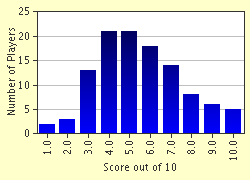Quiz Answer Key and Fun Facts
1. "The animal for this offering is to be killed on the north side of the altar, where the animals for the burnt-offerings are killed, and its blood is to be thrown against all four sides of the altar." Which of the following offerings is this referring to?
2. If an object has been deemed unclean after seven days by a priest due to the spread of mildew, this object must be cleansed?
3. According to Leviticus, the Lord presented a special day of rest. On which of the following should everyone "Present a food-offering to the Lord and do none of your daily work."
4. In the making of 'The Bread Offered to God', twenty-four pounds of flour is enough to bake how many loaves of bread?
5. When loaning services to the poor or less fortunate, how much interest is one allowed to charge for their hospitality?
6. A sin-offering is required in which of the following cases?
7. Which of the following "must be put on every grain-offering because it represents the covenant between you and God"?
8. What happened to Aaron's sons Nadab and Abihu for disrespecting the Lord's holiness?
9. "If a fellow-Israelite living near you becomes so poor that he sells himself to you as a slave, you shall make him do the work of a slave until the next Year of Restoration." Is this statement correct?
10. Which of the following statements is the last one in the Book of Leviticus according to the Good News Bible?
Source: Author
apathy100
This quiz was reviewed by FunTrivia editor
ArleneRimmer before going online.
Any errors found in FunTrivia content are routinely corrected through our feedback system.

